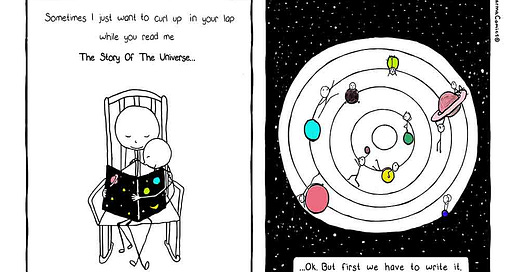Image by by Dharma Comics
Hello!
In the past couple of weeks, I've heard the words "back to basics" three times in three different scenarios. In one instance, it was in reference to a media company that grew because of the success and popularity of its simple model: it delivered journalist queries to PR people and experts in one text-based email multiple times a day. Nothing fancy, just text and emails. A large media conglomerate bought it and launched it into a complex database, limiting free access with full access behind a pay wall, and guess what? No one used it. The simplicity was gone. The audience was no longer being served.
Shockingly, the founder of the original email and text-based service received thousands of emails from people asking him to resurrect the original service. He did, giving it a slightly new name, and within 48 hours, he had 10,000 subscribers and the basic framework back in place. The purpose and intention were clear (quickly and efficiently connecting journalists with experts) and the audience was being served again.
In his announcement about the resurrection of his original creation, the founder said, "I had a journalism professor at Boston University who once told me to ‘be brilliant at the basics.’ He was right. He's still right. The basics are what matter. The fancy things are all fine and good, but if you don't get the basics right, or worse if you replace the basics with things people never asked for, that's where you run into trouble."
What a remarkable full-circle moment.
The other scenario that caught my eye recently was the return of CEO Bob Iger to the Walt Disney Company. All social politics aside, Iger's mission is to get Disney back to its roots (after multiple failing films), which he says is "to entertain through quality storytelling." While Disney has a long history of infusing storytelling with positive morals, Iger believes the company needs to cut back on the number of movies Disney makes and focus on making engaging stories first. He wants Disney to get back to "prioritizing storytelling over messaging." Quality over quantity.
The third scenario I've witnessed unfolding that further illustrates the "getting back to basics" movement is with in-person author events. There are many in-person opportunities, such as readings, writing communities, book clubs, and good old-fashioned book signings!
My career in publishing started with book signings – I've coordinated massive events with Hillary Clinton, football legend Barry Sanders, famous chef Emeril Lagasse, author Tom Clancy, and many others. Hundreds of people would be in line to meet these authors, but I've also done plenty of book signings where 2 or 10 people show up. Regardless of how many show up, it's a way for authors to connect with their readers directly – and I can tell you the authors who greeted the 2-10 people the same as the ones who greeted the 100+ were the most likely to grow their numbers. Luckily, authors now have so many other ways to connect with readers (an email newsletter should be one of them). However, there's still something nostalgic about a bookstore event that makes authors feel like real authors, and I'm thrilled to see them gaining popularity again.
In times of significant fear about AI taking over jobs, especially in the creative arts like film/TV, journalism, and publishing, these "back to basics" movements are significant developments. It means that, at our core, humans need to connect to other humans. Technology can be an aid and a tool, but it can never replace deeper human connection. And what's the most proven method of connecting with other humans since the beginning of time? Storytelling.
Sometimes, we need to simplify things and get back to basics.
With this newsletter, my intention is simply to help authors become better authors by sharing insider secrets to the business of book publicity. And thank you to one of my clients, author Robin Finn, and her book Heart. Soul. Pen.: Find Your Voice On the Page and In Your Life, for getting me back to writing!
Here are 3 Things on a Tuesday you might find valuable:
SOMETHING TO READ
Why the Bestseller List Should Not Be Your Goal
Agent Kate McKean writes in her newsletter, Agents and Books, about how the bestseller list is not the marker of success most authors should be focused on, why, if it is, you are likely to be disappointed, and the truth and reality behind the list. Well worth the read.
SOMETHING TO WATCH
Friends
My 15-year-old daughter and I just finished watching the entire series of Friends. After the last episode, she said, "That took us two years to watch!" (We kept falling asleep and had to rewatch some episodes.) But I laughed and replied, "It took me 10 years to watch it the first time!" I could easily start back on episode one and watch it again or pick up anywhere in between at any time. The writing, the comedy, the actors, the connection. It was so good and representative of a more holistic social connection time. The fact that my daughter can love it just as much as I did when I was her age is a sign of great storytelling. It wasn't just a show about a group of friends in NY; it was a series of stories about the human condition at that stage of young adult life – something everyone can relate to.
It's disappointing how little good TV there is these days. If anyone has a recommendation for a new series, please comment below!
SOMETHING TO LISTEN TO
I'm a loyal listener of The Tim Ferriss podcast, usually while on my morning walk with my dog (cute photo at the end). Here are the recent episodes I recommend:
Author of the new book Slow Productivity: The Lost Art of Accomplishment Without Burnout, Newport shares incredible lessons for authors who need to hear that they can take time, significant amounts of time, to dedicate themselves to quality over quantity. For example, you can release a book every 3-7 years, not yearly.
#725: Barbara Corcoran – How She turned $1,000 into a $5b+ Empire.
While she's famous now for her success, Corcoran talks all about how she beat the boys at their game by being a better storyteller and never feeling limited by the box of traditional business practices. She's hilarious, sincere, and an inspiration.
BONUS:
MasterClass with Michael Lewis – Tell a Great Story. The author of mega-hits like Moneyball and The Blind Side, Lewis somehow makes lessons in economics into drama-filled epic tales of brilliance. In this masterclass, he teaches how storytelling can improve your life, everything from work to family and everything in between. He explains that, for example, in Moneyball, baseball is just the example, but the real story is about the underdog, and one person motivated by revenge changed an entire sport by bucking the restrictive systems in place. I highly recommend it.
A QUOTE TO INSPIRE
"Good work does NOT require an increase in busyness,"
- Cal Newport, author of Slow Productivity and Deep Work
Thanks for sticking with me and this sporadic weekly publication. If you’re interested in working together, find me at Parallel 33 PR or get my ebook for new authors here.
Cheers!
Carina
P.S. My dog, Eazy, on a morning walk patiently waiting while I start a podcast or audiobook.







